By Marise Redmann
(Originally published in 2023 Door County Go! Guide)
With all the excitement of Door County’s villages, each located on the main drags of Highways 42 & 57, ever wonder what lies beyond, or inside rural Southern Door? Heard of Forestville, Clay Banks, Kolberg, Brussels or Namur? In many ways, the “the space between” is truly the beating heart of the Door Peninsula.
Right in the middle of northern Door, just south of Carlsville, a few miles east of Highway 42, where the centerline disappears and surrounded by a quilt of fields, stands a bright red barn. Here you’ll find chickens, ducks, horses, cats, dogs, goats, six hives of honeybees, 40 sows, and 50 Holstein cows milked twice a day, as well as crops of corn, alfalfa, winter wheat, soybeans, and oats…plus maple syrup tapping, a sawmill, and a great love of farming. This is Cherryland Dairy Farm, founded in 1902 and home to Mike and Jamie Henschel, leading the family’s 4th and 5th generations of Door County farmers. Their love and diligent care produces cheeses and ice creams enjoyed countywide.
Nearby is Schartner’s Farm Market, between Carlsville and Egg Harbor, another multi-generation farm. Schartner’s starts their season in March by tapping the nearby maple trees for syrup. Then it’s asparagus, strawberries, rhubarb, sweet cherries, raspberries, tart cherries, sweet corn, pears, plums, apples, and pumpkins, in that order. The market sells an array of homemade jams, dressings, seasonal vegetables, pie filling, and Karen’s famous homemade cherry pie. “The pie-making starts at 4:00 a.m., shifts into cherry and crop harvesting, then pick-your-own sales, running the store, and getting the harvest to processing,” Karen’s son Jaden Schartner said.
This is a major feature of “the space between,” i.e. the sustaining intersection between farming and tourism. Sustainable broadly means “a holistic approach that considers ecological, social, and economic dimensions, recognizing that all must be considered together to find lasting prosperity” (Brundtland Commission). Sustainable in the agricultural world is “the practice of farming using principles of ecology, the study of relationships between organisms and their environment” (Door County Comprehensive and Farmland Preservation Plan 2035). We can also understand sustainability through the advent of agritourism and the famed Montmorency cherry.
Door County fruit growing began with Joseph Zettle, who initially planted apple trees in the local shallow soils that proved difficult for other crops. The UW Horticulture Dept. tested fruits like apples, plums, and pears, but the tart cherry crop of 1896 was the ultimate success, and the county eventually produced 10% of the U.S. Montmorency crop. The cherry market has declined since its 1950’s heyday, but cherry and other fruit orchards are still a big draw for visitors, from the burst of blossoms in May, to pick-your-own cherries in July, and the apple harvest in October.
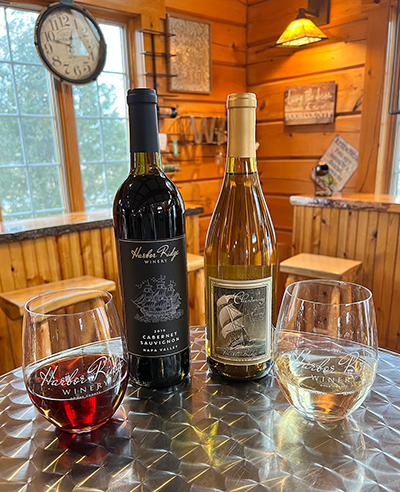
Another example is Lautenbach’s Orchard Country Winery, a multi-generational farm family in Fish Creek. “Fruit farming is so dependent on the weather and conditions,” Chris Lautenbach said. “We could lose an entire cherry crop with a poorly timed hailstorm. That’s why we needed a more dependable product line in addition to the fruit stand, which led us to create the winery.” Founder and visionary Bobby Lautenbach, who passed away in 2021, was a successful leader of agritourism initiatives that included the winery, farm market, a pick-your-own apples operation, and horse-drawn sleigh rides over the orchard’s winter snow.
With wineries popping up throughout the county in recent decades, it became clear that organizing would bring awareness and support. Nine unique wineries now comprise the Door County Wine Trail, whose members offer wine-tastings, special events, tours, and live music. One of those members, Door Peninsula Winery, was founded in 1974 and has since become the third-largest winery in Wisconsin, producing a wide array of popular fruit-based wines in Carlsville (its sister business, Door County Distillery, produces a spirit rated the best gin in North America).
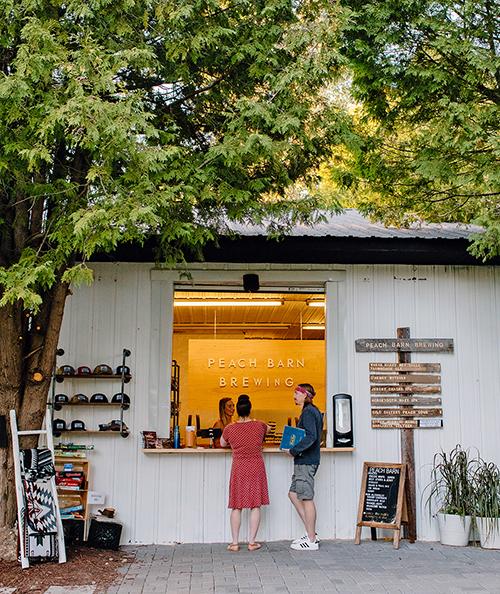
Distinct breweries complement the county’s vibrant wine culture. Among them are Bridge Up Brewing Co., Door County Brewing Co., One Barrel Brewing Co., Peach Barn Farmhouse and Brewery, Shipwrecked Brew Pub, and Starboard Brewing Co. Other unique beverages from Island Orchard Cider, Tapuat Kombucha, and Hatch Distillery have also joined this market.
The cherry on top (from my perspective, having grown up on a cherry farm), is cherry juice. Found to have antioxidant properties and natural benefits in addition to its tantalizing taste, it can “assist with muscle pain and fatigue,” says Mike Johnson, owner of the Country Ovens market in Forestville and the Cherry De-Lite line of food products. Mike and wife Kathy started their business by packaging dried cherries for snacks and recipes. The by-product was cherry juice, where some went to wineries, but an overabundance resulted in the cherry drink, both pure and sweetened, found in many Door County bars and restaurants. And dried cherries are still a favorite, especially with one irresistible complement: chocolate.
Farming and community are closely intertwined on the peninsula, and you get a taste of that when visiting farms south of Sturgeon Bay, in Southern Door. The experience can be found at a soup festival event called Booyah & Bread (April 23, 2023). What’s Booyah? Throughout the area’s early Belgian settlements, farmers traditionally brought their harvests together for community festivals where enormous pots of soup were carefully prepared over a wood fire and served to the entire community.
My daughter and I tried booyah and were overcome by the succulent nourishment, borne by the chefs’ pride. This delicious one-pot harvest soup, served in styrofoam bowls with home-baked bread and desserts, at the former St. Mary of the Snows Church (now a historical society called the Belgian Heritage Center), was a fascinating educational journey. You can also try booyah at the annual Belgian Days festival (July 7-10, 2023).
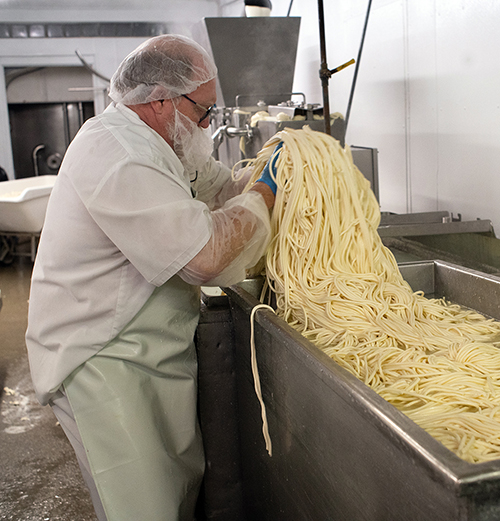
While visiting Southern Door, a must-stop is award-winning Renard’s Cheese. Established in 1961, now run by a new generation of owners, Chris and Ann Renard. The hard-working couple touts the rich soil nutrients that create lush grazing for local dairy cows as the reason for the high-quality milk used in their cheeses. Renard’s focus on sustainability includes fresh cream transported to a local dairy for butter, whey sent to a processing plant to create protein snacks, drinks, and animal feed, and cheesemaking water that is delivered back to the environment to re-enrich the soil.
Visiting the Renard’s store on Hwy 57, you can try a selection of cheese, including Cheddars, Colby, Farmer, Muenster, Brick, Marble, Monterey Jack, Mozzarella String, Smoked String and over 50 flavor-infused specialty cheeses. Other local products are wines, soaps, crackers, dips, sausage, bakery items, take and bake pizzas, and ice creams. You can’t leave the store without delicious cheese curds, what locals have called “squeaky cheese” for generations. Many Door County restaurants offer deep fried cheese curds on their menus, a tasty appetizer you’ll probably fall in love with.
While in the neighborhood, in September and October, visit the Red Barn Corn Maze, just down the road from Country Ovens. This is the most fun agri-tourism you can find, with a huge corn maze that can be explored by day and by haunted night. The business offers hayrides to their pick-your-own pumpkin patch.
Many orchards in Southern Door offer pick-your-own cherries: Kielar Akers Orchard, Cherry Lane Orchards, and Meleddy Cherry Orchard near Forestville, and Sir Reginald’s Sweet Cherry Orchard and Paradise Farm Cherry Orchard near Gardner.
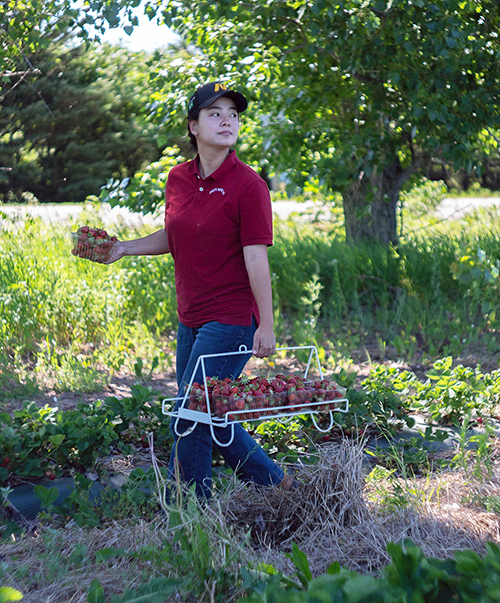
Just northeast of Gardner is Sully’s Produce. The business has 40 acres of hand-picked produce, bakery, homemade jams and jellies, flower arrangements, and our family’s favorite, a lemon poppyseed cake. Sully’s provides gardeners with a head start on plantings, including the often-difficult broccoli, in May plant sales, and helps stock the county with fresh produce at weekly farmers markets.
Another type of farming you’ll find in Southern Door after all the vegetables and fruits are put to bed, is tree farms. Between Brussels and Forestville is a tiny community called Kolberg…but don’t blink because you might miss it. A little gem on Kolberg Road is Door County Trees, a robust Christmas tree farm that gives guests the adventure of searching, picking, cutting, and hauling the tree of your holiday dreams. The farm offers Balsam, Frazier, and Canadian firs. And if you don’t bring your own saw, they’ll have one to borrow.
Taking a drive on the back roads of the space between are dozens of roadside markets, from Sorens Valhalla Orchard and Malvitz Bay Farms, south of Sturgeon Bay, to Seaquist Orchards Farm Market, north of Sister Bay, that offer local produce, homemade cherry pie, maple syrup, honey, pumpkins, sweet corn and much more.
One choice is Door County Fruit Connection on the main intersection in Carlsville. The market uses Organic Materials Review Institute-approved methods and advanced integrated pest management practices to keep bees (and people) alive and well. Instead of herbicides for weed control, the Connection mulches, mows, hoes, and ground cloths their trees.
The Valmy Thresheree (August 18-20, 2023) provides a step back in the recent past. Home of the Northeastern Wisconsin Antique Power Association, the Thresheree offers visitors a unique opportunity to experience both farm machinery and a farm community in action. Locals compete in events like the antique tractor pull, chainsaw competition, kids’ pedal tractor pull, and a cavalcade of power. The biggest draw, one where the women dominate, is pig wrestling. Hard to watch but also hard to look away, know that the pigs are very properly treated.
In Northern Door, experience the Liberty Grove Antique Tractors & Arts Festival (July 22-23, 2023), located at Liberty Grove Historical Society’s property. Festivalgoers enjoy pony and hayrides, artisan exhibits and demonstrations, food, beverages, ice cream, live music, and a display of antique tractors and machinery like the old-time cherry shaker. The 13 buildings and their donated historical items present the life of early European settlers.
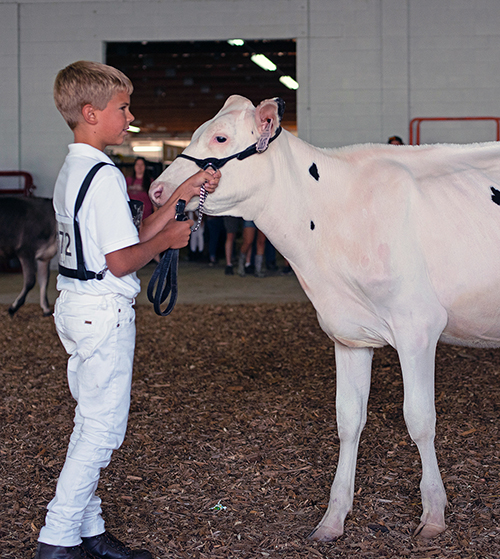
A favorite for both visitors and locals is the Door County Fair (Aug. 9-13, 2023), established in 1871, with grandstand attractions, carnival rides, a racetrack, and games. Aside from the entertainment and midway rides, “Fairs are vital in bringing agriculture to the forefront in communities,” said Shari Black, CEO of Wisconsin State Fair Park. The fair gives young farmers a chance to showcase their well-bred animal of choice, like cows, fowl, pigs, rabbits, and compete in equestrian events. It’s amazing to watch kids maneuver and adjust cows so much bigger than they are!
To immerse yourself in farm life, a visit to The Farm, just north of Sturgeon Bay on Hwy 57, is a must. This was a favorite weekly spot when my kids were little, and they still enjoy it as young adults. Started in 1966, The Farm is a living museum of rural America, with farm animals in their natural surroundings, historical exhibits, demonstrations of milking, nature trails and more. Visitors can bottle feed the goat kids, lambs and piglets, and feed corn to the older goats and sheep. Pull little ones in wagons as they cuddle a kitten for the journey. Discover the difference between wheat, oats, rye, soybean, and corn. Bring a lunch to picnic on the grounds and make a day of it.
Perhaps the most picturesque farm is Horseshoe Bay Farms on County G just south of Egg Harbor. Horseshoe Bay Farms was one of the largest and most distinctive farms developed in the early 1900’s, operating both above the bluff (cultivating cherry, apple, and plum orchards) and below the bluff on the shores of Green Bay (focused on cattle breeding, hogs, chickens, dairy, and grain). The Farms were at that point the pride of Door County and positioned the Peninsula in the front ranks of the agriculture community.
Today, Horseshoe Bay Farms is no longer an operating farm. After much of it was developed in the 1990’s with homes, condos, and a membership golf club, neighbors purchased the remaining farm below the bluff as a non-profit organization, to preserve the iconic landmark as a center for sustainable stewardship. The buildings were refurbished and a community center of learning and programming was established. The history is rich for exploration during farm tours. The farm is also the site of the amazing art installation Stickwork (by Patrick Dougherty and son Sam), and wander the extensive dahlia flower farm.
Horticulture is still a big contributor to the Door County economy, adding over $3 million to by means of Christmas trees, fruit, sod, flowers, trees, landscaping plants, nurseries and greenhouses. One of the most spectacular horticulture farms that must be inhaled to be believed is the Fragrant Isle Lavender Farm on Washington Island. The farm is home to nearly 30,000 lavender plants of 14 varieties, a demonstration garden, essential oil production facility, gazebo, shop, and outdoor café and beverage bar. The owners cultivate an all-natural environment, provide education about lavender’s uses and benefits, and invite guests to wander and sit among astoundingly beautiful vistas.
There are smaller vegetable farms dotted across the county, supplying restaurants and locals in the farm-to-table industry. Farm-to-table means that the food on the table came directly from a specific farm, without going through a store, market, or distributor along the way. Sometimes, it’s a place where chefs prepare and serve the food right at the farm. Hidden away on Beach Road in Sister Bay is Hidden Acres and Beach Road Community Garden, the family project of Tom and Carolyn Rehberger, who created a community garden around their passion for gardening, cooking, and healthy foods. They supply produce to a dozen local restaurants and collaborate with Door County Underground (Matt Chambas and Jamie Mead), to create a farm-to-table signature dining experience.
Some of the smaller farms sell at the six local farmers markets: Ephraim (Water St. onMondays), Jacksonport (Lakeside Park on Tuesdays), Fish Creek (Settlement Shops on Wednesdays), Sister Bay (Sister Bay Historical Society’s Corner of the Past Museum on Saturdays), Sturgeon Bay (downtown), and Washington Island (Gathering Ground). All feature access to excellent producers and entrepreneurs of natural products, food, fish, flowers, and arts and crafts.
One such entrepreneur at the Baileys Harbor Farm Market is often referred to as “The Bread Lady,” known county-wide for the best sourdough bread, bagels, focaccia rounds, and rolls. The Bread Lady is Mattea Fischer, who created Cultured, a micro sourdough bakery and fermenter located at the corner of County Q and Hwy 57. The offerings vary weekly, with dynamic pairings like Chocolate Cherry focaccia, Country and Jalapeño Cheddar, and Cranberry Brie. All the breads are naturally leavened and use 100% organic flour, while the fermented vegetables use organic or local and pesticide/herbicide-free products. Her bread also appears at Waseda Farm Market, Healthy Way Market, and Madison Avenue Market, and you can order online for arranged pick-up.
When we talk organic, what exactly does that mean? Originally, the Potawatomi Indians, an indigenous Door County tribe, sustainably cultivated corn, beans, and squash, known as the “Three Sisters.” Later, small family farms historically practiced organic agriculture because it was the only way to control pests, until the advent of chemicals like DDT in 1939. Today, new advances are leading farming back—or forward—to organic farming.
The organic farm doesn’t use herbicides, pesticides, fungicides, or chemical fertilizers, and the animals are humanely treated without hormones or antibiotics. Grazing herds eat grasses, legumes, brassicas, and small grains, and are moved between paddocks to recycle nutrients through their manure. Organic farming is gaining popularity in Door County through farms like Door Karma Farms, Waseda Farms, Wilke R Organic Farm, and Door County Garlic. Local organic products can be found in grocery stores and restaurants, or online on LocalHarvest.org and the Facebook group Door County Farm Direct.
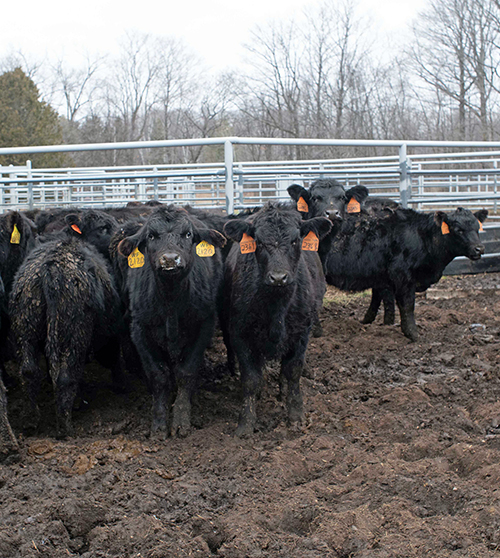
Door County’s largest and most-established organic farm, Waseda Farms, has hosted humanely-raised animals on over 1,500 acres of certified organic pasture since 2008. Visit the farm on Logerquist Road, West of Baileys Harbor, and enjoy the hiking trails and farm market, selling meat products, cheese and dairy, produce, natural groceries, local beer, and organic wines. Many of their meats are found in neighborhood grocery stores and served in local restaurants, who proudly display “Waseda” on the menu.
Although being “Certified Organic” requires an intense, lengthy process, local farms such as Country View Farms LLC, Brey Family Beef, Narrow Gate Farm, and Sunset Farm use responsible and humane practices and sell to farmers markets, restaurants, and even to a popular Wisconsin restaurant chain, Culver’s.
Door County’s local FFA chapter puts on an annual farm-fresh all-you-can-eat dairy breakfast (July 2, 2023) using local products to entice travelers and locals to visit the sponsoring farm and get a taste of farm life. The event was started 42 years ago as a fundraiser for students to attend FFA’s agricultural education programs.
Due to declining farms in Wisconsin, the Dept. of Agriculture, Trade, and Consumer Protection (DATCP) and the Dept. of Development created a farmland preservation plan that encourages retention of farmland. This plan is in full effect in the town of Clay Banks, home to 273 acres of qualifying zoned farmland and 91 acres of the Land Trust Legacy Nature Preserve, including nearly 3,000 feet of undeveloped shoreline. Just south of that is La Salle County Park which includes another 23 acres with 440 feet of shoreline. The area is ripe with fruit stands and pick-your-owns.
Our local waterways and farms are closely connected. Rep. Joel Kitchens and Sen. Robert Cowles created legislation to connect farmers with conservation, investing in safe ground water and the waters that surround this peninsula. “Nitrate is one of the most common contaminants in drinking water. It gets into water from fertilizer runoff, manure from animal feeding operations and wastewater treatment plant discharge,” according to Environmental Working Group. The legislation invests in helping commercial farms safely mitigate the discharge of nitrates.
This development is of interest to beach bathers concerned when beaches are closed due to high levels of E. coli. It’s just as important to the “lake farmers,” commercial fishermen who supply salmon, perch, walleye, lawyers, and whitefish to restaurants. It’s a delicate balance focused on constant research into sustainability.
One example is Hickey Brothers Fish Market and Hickey Bros Fisheries, a fourth-generation fish retailer and commercial fishing operation, respectively, in Baileys Harbor. Hickey Fisheries has worked with the DNR, Sea Grant, Fisheries Co-op at UW-Stevens Point and U.S. Fish & Wildlife to “complete numerous assessments, tagging, and research projects” aimed at fishery management, operational expertise, and data collection.
The WI DNR also plays a vital role in maintaining the Great Lakes sport fishery for coho and chinook salmon, steelhead, and brown trout by spawning eggs at the Strawberry Creek spawning facility in Sturgeon Bay. The industry helps support sport fishing and brings many people to the area for bass, salmon, steelhead, brown trout, and ice fishing tournaments. There are also now two dozen fish charters available for a day of fishing.
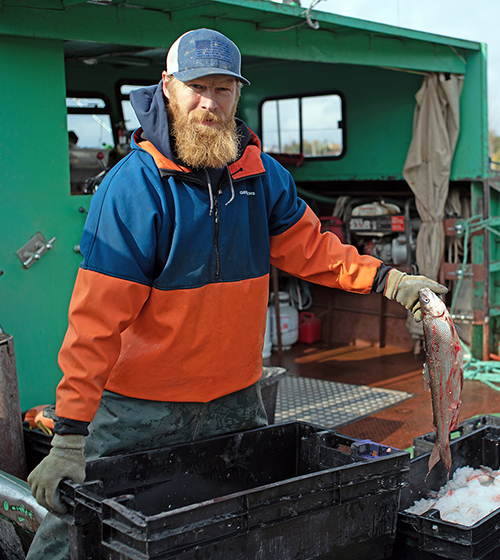
Henricksen Fisheries, established in 1987, is a wholesale whitefish supplier to more than 30 local restaurants. The company brings the public fresh, local, sustainable whitefish year-round. The company’s fresh fish is available at local farmers markets and at Henriksen Fish House in Ellison Bay, which offers boneless fillets, whitefish spread with both cream and goat cheese, and whitefish cakes.
Henricksen Fisheries is one of the suppliers to Charlie’s Smokehouse, a Gills Rock icon started in 1932. Now open year-round, the business has perfected the craft of smoking fish and offers a selection of locally caught whitefish, trout, and salmon, among other fish varieties.
To keep the small family farm alive and thriving, recent advances in government programs and collaborations with the University of Wisconsin system use science and education to promote regenerative agriculture and healthy food practices. According to the UW-Extension, agriculture accounts for $243 million in economic activity in Door County and contributes $90 million to the county’s total income, paying $4.7 million in taxes. Agricultural processing is a key local industry, especially processing milk into dairy products, plus meats, fish, and cherries as other major, sustainable products.
I’ve barely scratched the surface of the bounty provided by those who till the land, grow the crops, and raise animals from gestation to table. Our farmers and fishermen monitor, understand, and predict the courses of our health and livelihoods. In this story of intersection and sustainability, today it’s clear how much we’ve always depended on one another.
# # #


 ALL CONTENT © 2024 BY DOOR GUIDE PUBLISHING
ALL CONTENT © 2024 BY DOOR GUIDE PUBLISHING




